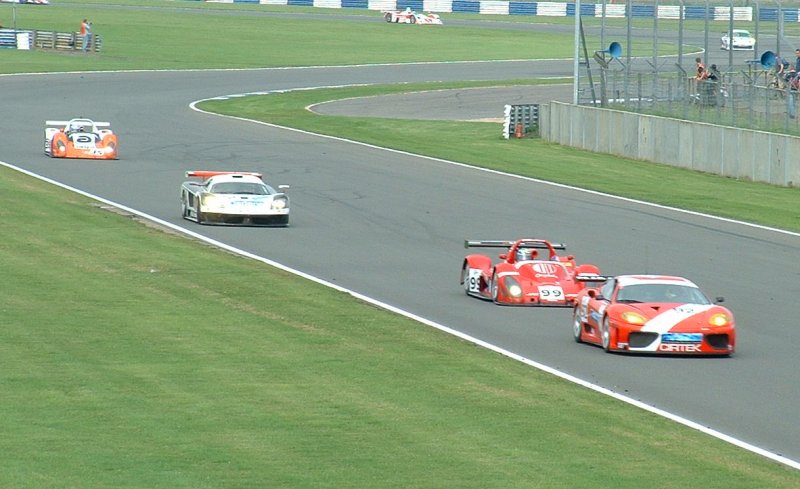Sportscar Racing in the 21st Century
Sportscar racing was into one of its regular slumps as the 21st century arrived.
There were pinpoints of light in the tunnel, with Don Panoz's ALMS series holding a race on New Year's Eve 1999, the Race of 1000 years, which was won by the Audi team, one of their cars bearing distinctive Crocodile livery and Le Mans remained attractive to all, including large manufacturers, such as Cadillac and BMW. Even struggling MG/Rover got in on the game with its ground breaking LMP675 car, which even now (in late 2004, remains the only thorn in Audis dominant side).
However, overall, sportscar racing was slumping. GT racing was back in the hands of enthusiastic privateers, after Mercedes steamrollered it into oblivion. Grand Am was struggling to compete with ALMS (and Bill France's obsession with Ovals). In Britain, rising costs were beginning to hurt the quality and number of entries in the GT class, although NGT remained popular.
Le Mans was won by Audi in 2000, with Frank Biela, Tom Kristensen and Emanuele Pirro starting the winning run, only broken by the Bentley (VAG's chosen marque that year) win in 2003. Privateer Audis won again in 2004, with the withdrawal of the Bentleys.
In the ALMS series, Audi are also the dominant marque and there have been sporadic European Le Mans series, also dominated by Audis, now in private hands.
The MG-Lolas have to battle them head to head, but occasionally embarrass the bigger cars. The works Corvette teams are generally able to keep the privateer Ferrari 550s at bay, although the 50 year Corvette celebrations were spoilt somewhat by losing the 2003 Le Mans win to a Prodrive 550.

Variety in LMES race, Silverstone, 2004
In the FIA GT series, Ferrari 550s became the car to have as the Vipers grew old and the Listers fell from favour as they became too developed from the original cars. The Saleens finally started to find the reliability to go with their performance in 2004 and Lamborghini's arrival in the series, and promise of Aston DB9 racers in 2005, boded well for the future of GT racing until the FIA retrod all their old mistake steps and allowed the Ferrari group to rebody the ridiculous Enzo hypercar into a full blooded racer as the Maserati MC12. For a moment it seemed sanity would reign as it was rejected for violating various limits (notably it's ludicrous overhangs), but within days of this rejection a 'compromise' was reached and it was let in, finishing 2nd and 3rd in its first race. The future looks bleak unless everyone is prepared to run the Maserati with draconian aerodynamic, fuel or weight handicaps. To these eyes, the back looks like nothing less than an early 60s Ferrari sportsracer...
In the N-GT class, Ferrari's 360 has provided some welcome relief to the Porsche monopoly, although the 911GT3RSR has tilted the balance back in the German marque's direction.
Grand Am in the States took a bold step of introducing 'low cost' prototypes, but these ugly looking sheds haven't proved popular and Daytona is now a mere shadow of its former glory as it ploughs its lonely furrow with this cars.

Variety in LMES race, Silverstone, 2004
The FIA's open top sportscar series foundered after a couple of seasons, after doing pretty well under private stewardship (there's a common thread in all this, somewhere...), but at least the cars and their teams were welcomed into the various Le Mans series.
In the UK, the decision was made to make NGT the top class and introduce a GT Cup class (which witnessed a VW Golf and Renault Clio entrant, which upset many purists). This seems to be working with reasonable success, although Stefan Ratel has now taken over the British GT promotion and is promising the return of a full GT class in 2005. However, the series is definitely in a slump, although probably holding steady or rising from it, as this is typed.
Belgium continued to run a fairly successful GT series, although, it too, toned down the exoticness of the cars in an attempt to reduce costs.
Spain, meanwhile, has a thriving GT series, with GT/GT2 spec cars in some numbers, battling over the outright championship.
The EuroGT series, which for a while continued to provide a home for much modified Ferraris and Porsches, as well as GT2 cars such as the Vipers and
LM600s, failed to run in 2004, with just a single pair of races at Zandvoort, for the regulars. Both races were won by Cor Euser in his Marcos, celebrating his 500th
race start in the first race.
Back To The Sportscar Racing Page
